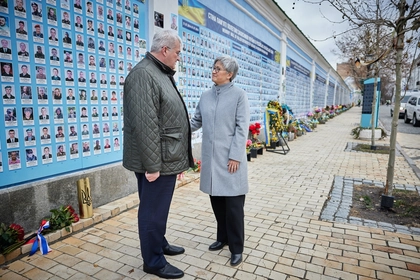Russia has been recruiting women from Africa, Asia, and Latin America under false pretenses offering them training and well-paid jobs only to end up assembling Shahed attack drones in Tatarstan, according to an Associated Press (AP) investigation.
Ads promised young women from countries like Uganda, Kenya, and Sri Lanka a work-study program in fields such as in the hospitality industries. However, upon arrival, they found themselves working long hours in factories making drones for use in Ukraine, under constant surveillance and exposed to harmful chemicals, the report says.
JOIN US ON TELEGRAM
Follow our coverage of the war on the @Kyivpost_official.
AP spoke to several women who described difficult working conditions, low wages, and misleading recruitment. One woman said she felt “trapped,” realizing that her job involved drone assembly, not the career she was promised: “I regret, and I curse the day I started making all those things.”
To address labor shortages during the full-scale war against Ukraine, the Kremlin has been recruiting women aged 18-22 from countries such as Uganda, Rwanda, Kenya, South Sudan, Sierra Leone, Nigeria, and Sri Lanka. The recruitment drive is also said to be expanding into other parts of Asia and Latin America.
According to the AP investigation, around 200 African women are now working alongside Russian vocational students, some as young as 16, in Tatarstan’s Alabuga Special Economic Zone, located about 1,000 kilometers (625 miles) east of Moscow. These women, who were promised work opportunities, now find themselves involved in key weapons production.

Australian Foreign Minister Visits Kyiv, Confirms Reopening of Embassy
“I don’t really know how to make drones,” said one African woman who left her job at home for what she thought would be a better opportunity in Russia.
A potential hint of what the job involved was a vocabulary test given to the applicants, which included terms like "factory" and verbs such as "to hook" and "to unhook."
Workers at the Alabuga plant are constantly monitored in their dorms and on the job, they work long hours for less pay than expected, according to three women interviewed by AP.
The factory management reportedly discourages African women from leaving, although some have managed to do so or find other jobs in Russia, though AP could not verify this.
Alabuga is the only Russian facility recruiting women from Africa, Asia, and South America to produce weapons, according to experts.
About 90% of the foreign women hired through the Alabuga Start program work on assembling drones, in roles requiring minimal skill. Leaked documents show the workforce growing from 900 in 2023 to over 2,600 by 2025, with foreign women handling tasks like assembly, chemical use, and painting.
Appalling working conditions reported
Foreign workers at the Alabuga plant face harsh conditions, living in dormitories under 24/7 surveillance and their movements controlled by facial recognition, according to social media posts. Workers are watched constantly, and pets, alcohol, and drugs being banned.
One worker told AP that they were taught to assemble drones and apply a caustic coating, with many lacking any form of protective equipment. She described how the chemicals left her face with “small holes” and intense itching. “A lot of girls are suffering,” she said.
While one woman said she enjoyed her time at Alabuga, most interviewed by AP disagreed, citing low wages and unfulfilled promises. Originally promised $700 per month, later posts indicated pay dropping to just “over $500.”
Workers’ salaries were also reduced by deductions for housing, airfares, and language classes. “The African women are maltreated like donkeys, being slaved,” said one worker, adding that sanctions made it difficult to send money home.
Despite the grueling conditions, some women tolerated the low pay to support their families. However, plant documents suggest morale is low, with managers considering replacing foreign recruits with Russian-speaking staff due to complaints about the pay.
According to Human Rights Watch, Russia’s recruitment tactics may amount to human trafficking if the jobs are misrepresented and exploitative.
The Alabuga plant aims to produce 6,000 Shahed attack drones annually, as reported by Kyiv Post citing the Wall Street Journal (WSJ). The manufacturing operation, located in hangars within the Alabuga Special Economic Zone along a tributary of the Volga River, reflects Russia's strengthening ties with Iran and various African nations.
In late 2022, Russian business executives struck a deal to establish the drone plant, paying $1.7 billion to Iran, partly made in gold bars. This information was confirmed by U.S. security officials and initially revealed by the hacker group Prana Network, which infiltrated email servers linked to Iran’s Islamic Revolutionary Guard Corps.
The leaked contract, verified by two British government advisers, indicates that the Alabuga facility will produce surveillance drones along with 6,000 Shahed attack drones each year,. By the end of April, the factory was already ahead of schedule, having supplied 4,500 Shaheds, as reported by the International Institute for Strategic Studies, a London-based defense think tank.
You can also highlight the text and press Ctrl + Enter






